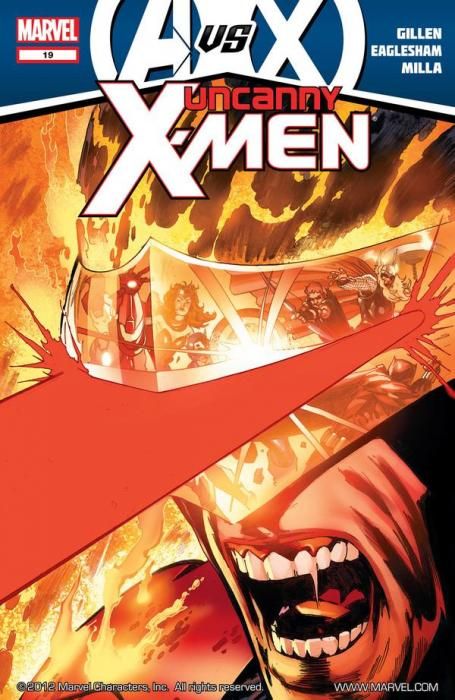Kieron Gillen writes "Uncanny X-Men" #19 entirely from Scott Summers' perspective, and he keeps the narration tight -- a great decision as the Scott Summers/Phoenix/Dark Phoenix voice doesn't seem like it would be about flowery exposition. Instead, Gillen focuses on what it might be like to have the epic power of the Phoenix and how it would change your perceptions and very self.
The strength of this issue is in the smart solid writing Gillen delivers, giving readers a compelling peek into what's happening to Scott Summers, and even what happened to bring him to this brink. There's even some humor to be found in the way that Gillen brings Wolverine back into the frame again and again, but on the whole I'm not sure the moments Gillen shows us are really a fair or balanced portrait of Scott Summers. Sure, we get the obvious moments: jumping from the plane with his brother, meeting the Professor, meeting Jean, losing Jean, having Emma, betraying Emma and Logan constantly there fighting him, but I'm just not sure they really add up to who and what Scott Summers is, especially what he has become in recent years.
The better summary of Scott Summers is actually toward the end, where despite his obvious horror at what he has done as Phoenix and Dark Phoenix, it's absolutely clear that he would do it all again, because it has brought back mutants from the edge of extinction. It's a sentiment that makes Scott Summers one of the most complex and compelling Marvel characters since perhaps Magneto, and I hope there is a rich future ahead in the exploration of this character, both good and ill.
The writing alone would earn this book an easy four stars, but two things drag it down. The first unfortunately is the art. While Dale Eaglesham delivers very well for the bulk of the issue, the emotional "post-Dark Phoenix" material with Scott Summers and Hank McCoy at the end feels rushed and inconsistent. It's the moment that all of this Phoenix nonsense has been leading up to in so many ways, and yet it feels like an afterthought -- not in Gillen's writing of it, but in the visual execution. This is a moment we need to feel, regardless of what those feelings are and artistically executed as it is, that emotion just isn't present.
The second issue is that the book feels ill-timed, even though I'm not sure how else it could have been timed. Reading it after "Avengers vs. X-Men" #12 feels wrong, but so does reading it before "Avengers vs. X-Men" #12. It's a book that fits nowhere. It can best be assumed to be a supplement to the ongoing story, a deeper look at Scott Summers, but it's just so much less effective than it should be without a true space to live within the crossover. As much as I wouldn't want this event extended any more than it already has been, it's almost as if the content here should have appeared in two issues: one about Scott Summers' internal experience as the Phoenix and Dark Phoenix and took place prior to "Avengers vs. X-Men" #12; and one that was about the aftermath including the "more mutants" revelation as well as Scott's reaction to it.
Ultimately, especially as written by Gillen, this book could have been a critical and emotional moment for Scott Summers and "Avengers vs. X-Men," but instead it just feels like a fill-in issue to pad an already overblown conflict.

